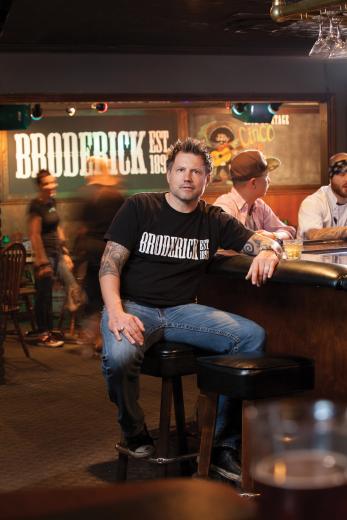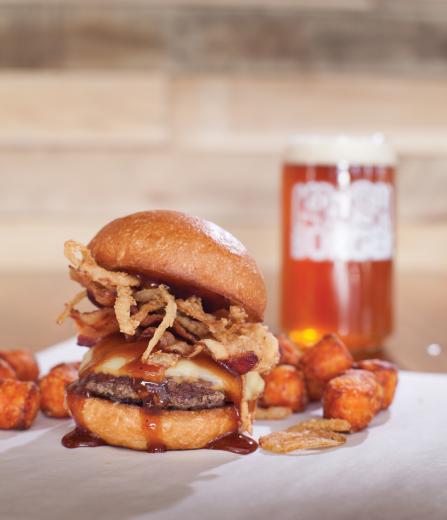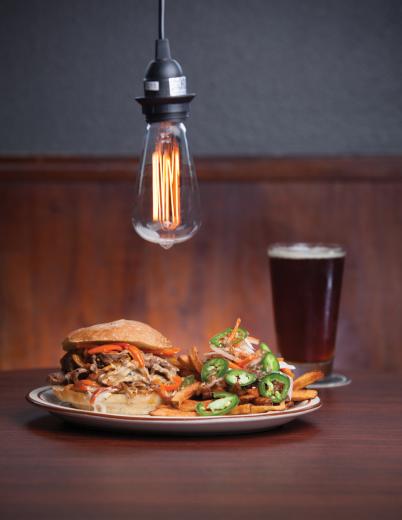Food truck success is leading to brick-and-mortar spin-offs for mobile restaurateurs ready to expand in Sacramento and beyond. For some, a fixed kitchen was always the goal, but for others, the choice to settle down was unexpected, the result of cultivating faithful patrons spreading the good-food word to more and more hungry friends.
Chris Jarosz is one such food truck owner who has come full circle. His rolling Wicked ’Wich enterprise was one of a small band of new-era mobile food trucks that — much to the chagrin of established brick-and-mortar restaurants — began roaming the streets of Sacramento in the summer of 2011. He is now a partner in Broderick Restaurant & Bar in West Sacramento, which opened in October, and was recently elected to the board of the Sacramento Chapter of the California Restaurant Association.
“From the moment I launched my truck, I was trying to find the right brick-and-mortar space to align it with,” Jarosz says. “It just makes more sense to have your own kitchen, storage space and parking space in a central location.”
Jarosz is not alone in pursuing this business expansion model. Fellow entrepreneur Andrew Blaskovich, owner of Drewski’s Hot Rod Kitchen, now has a contract to run the kitchen at Republic Bar & Grill in downtown Sacramento. Davin Vculek, owner of two Krush Burger (originally Mini Burger) trucks, took it one step further. In February, he opened the first of what he plans will be an international franchise of Krush Burger restaurants. The premier location is located on the campus of the California Lottery Headquarters in Sacramento’s River District.
Like Jarosz, Vculek said a brick-and-mortar element was always part of his plan.
“The purpose of the truck was to test the concept of doing quick service burgers the way we do it,” Vculek explains. “The result was overwhelming, so we ended up building the truck business up a little more than we thought we would.”
For both budding restaurateurs, mobile vending served as a method of testing the market, creating a following and attracting partners and investors before laying out massive capital. According to Paul Somerhausen, co-founder of Sacramento Mobile Food (SacMoFo), this has become a common tactic among today’s mobile food operators.
“As we all know, the restaurant industry is a very expensive and high-risk business to get into. The food truck concept acts as an incubator for successful businesses,” he says. “For as little as $60,000 to $100,000, these entrepreneurs can launch a concept, test it and change it if needed.”
And while Somerhausen notes the Sacramento mobile food movement has grown from the original Mini Burger to more than 30 trucks, it is still a very difficult business in which to succeed.
“People love our SacMoFo events, and media loves to report on the success stories but just like in the brick-and-mortar business, there are a lot of truck operators that don’t make it,” he says. “That’s why it’s so great when you see some of the operators taking the next step and actually opening their own restaurants.”
For Jarosz, the restaurant came about when he was approached about mobile food events at the site of the old West Side Bar and Grill in the Broderick neighborhood of West Sacramento. He quickly became enchanted with the boarded-up facility.
“When I toured the space, I saw it had everything I needed to prepare my food. I saw this place as a little hidden gem. It reminded me of the Pittsburg dive bars I grew up in. The kitchen was the clincher; once I saw that, I began negotiating for the space and took over the lease,” he says.
Now, Jarosz says he is better able to mitigate food waste. Also, the Broderick location offers some stability to the always-in-motion truck business.
“You’re on the streets six days a week and nights during the summer. You’re having to move to five different spots a day, and you have to sell massive amounts of food quickly,” he says. “It’s hot during the summer and cold in the winter. Coming back to Broderick is like going home.”
Still, he’s quick to note the Wicked ‘Wich is paying dividends.
“For a startup restaurant, it’s nice to have an established marketing and sales vehicle on the road,” Jarosz says. “That really helped me attract the partners I needed to make Broderick happen, and we immediately had business when we opened the doors. By month two, we were hitting some amazing numbers, and by the end of month three we were hitting numbers that it would have taken most restaurants a year to hit.”
This summer, two Wicked ‘Wich establishments will open at Raley Field and in the Downtown Plaza. And officials from the city of Elk Grove have approached Jarosz about converting a long-vacant brewpub into a Broderick-style roadhouse.
Meanwhile, Vculek and his partner Joseph Blanton have been mapping a slightly different route to worldwide burger domination.
“There are a lot of people trying to make their mark in the better-burger market,” Vculek says. “So we wanted to go out and get a good feel for what we were doing before we sank a bunch of money into a location.”
They made small, slider-size burgers and sandwiches with high-quality meats, produce and sides. But, unlike many trucks that roam the streets of the city, Krush Burger developed partnerships with businesses, commercial and retail properties where the trucks have scheduled stops. And since many are outside city limits, they get around the 30-minute ordinance.
Krush Burger’s presence in the River District caught the attention of higher-ups in the State Lottery building and led to a permanent restaurant on the campus.
“The lottery came to us. They were very aware of the success we had operating around this neighborhood, and they offered us a good deal,” Vculek says. “If you come in around lunchtime, you’ll see why.”
According to Vculek, the street-front location rotates through its 64-seat capacity a few times each lunch hour. Outside seating has recently been opened up as well.
“The biggest unknown was for evening dining,” he says. “And that continues to get bigger and bigger. On Friday and Saturday nights here — in the River District with nothing else around — we will be full. There will be a burger and beer on every table. It’s really neat to see.”
And Vculek is still expanding. The next move is to franchise.
“We have a few right now that are in the works. As soon as our franchise offering is complete, we will be opening with a partner here in California,” he says.
As of press time, Vculek was unable to confirm the exact locations, though he did say the partnership was eyeing markets in San Francisco and Sacramento. But the biggest announcement has already been made public: Construction is underway on an international franchise location in Dubai. A second is planned for Abu Dhabi.
“This all came about because there was a group of Arab investors looking to bring a unique U.S. burger concept to their homeland,” Vculek explains. “They didn’t want another McDonald’s or Burger King. They wanted a different experience.”
The investors actually found Krush Burger with a Google search. “That was really the basis of their research,” Vculek says. They came for a visit, spent a couple weeks checking out the business model and the deal was done.
In addition to new trucks now on the road, Somerhausen says the mobile-to-mortar expansion strategy is working the other way around, too.
According to a recent survey by the National Restaurant Association, nearly six out of 10 consumers would visit a food truck if their favorite restaurant offered one. Chando’s Tacos, a restaurant out of north Sacramento, was one of the first to add a truck. The Squeeze Inn now has a couple.
Mai Pham’s Star Ginger Asian restaurant group has also entered the fray, albeit with a slightly different twist. In October 2011, the Star Ginger truck took up daily residence on the UC Davis campus. Pham entered into an agreement with Sodexo to operate the truck. Headquartered in France, Sodexo has the food service contract for UC Davis. The truck offers a seasonally rotating menu to campus patrons and, according to Pham, has driven new business to her Sacramento restaurants.
“It has really worked out great for both parties,” she says. “I’m getting new customers, and they’re getting great daily foot traffic. There’s a very good chance Sodexo will be taking this brand to other locations around the country.”
Back at Broderick Restaurant & Bar, Jarosz surmises that what has transpired in the local mobile food business over the past two years may be a natural evolution of the industry.
“The big boys, the corporate kingpins of the food industry, have taken notice of the food truck phenomenon,” he says. “There’s no reason a Morton’s of Chicago Steakhouse couldn’t roll out a fleet of trucks some day. It’s an incredible marketing tool and a great way to take your concept to the masses.”
Recommended For You
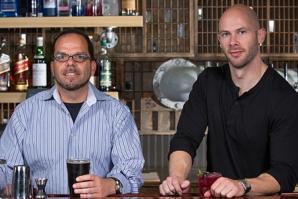
The Pitmaster
Chef Jacob Carriker helped turn a nightclub into a BBQ-lover's dream
The past two years have been remarkably unpredictable for long-time Sacramento chef Jacob Carriker.
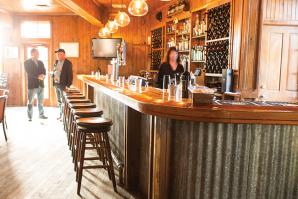
The Sloughhouse Experience
How a local couple is revitalizing a historic eatery without a chef, a restaurant background or investors
For the new owners of the Sloughhouse Inn, the challenges of running a restaurant began when patrons started walking through the door. Apparently, management wasn’t actually planning on customers showing up.



